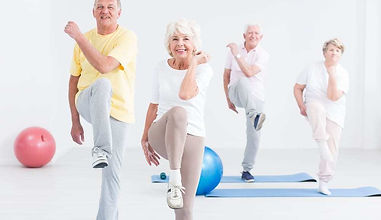BUSTING THE MYTHS
Myths About Elderly
The elderly is a group of people that should be cared for and respected. They offer a source of wisdom and inspiration for the youth of today as well as pieces of the past that show glimpses of different times. There are many myths that surround the elderly that one would not think of that open eyes to the different perspectives of generations.
Myth #1: Aging Adults are an Economic Burden.
This myth comes from the common misconception that the elderly is old and fragile and a burden to society. In an article by Leacey Brown in “5 Myths about Aging,” she says that “there is a common misconception that older adults do not work … [but] adults currently over 50 generate a minimum of $7.1 trillion to the economy each year” (Brown 1). This fact proves that the elderly is not just lying down and becoming a burden financially, but instead are rising out of this myth and providing for themselves in the economy. Brown also gives some statistics on amount that the elderly is contributing to society. She states, “participation in labor in men over 60 is at 35%, which is an increase from 26% in 1996” (Brown 1). She is showing everyone evidence that elderly men have worked more since 1996 and have acted in sustaining for themselves in society.
Myth #2: Most Aging Adults Have Dementia.
All the elderly is sick and dying. All the elderly is always in the hospital. All the elderly is in a nursing home or psych ward. These common misconceptions about the mental capacity of the older generation is completely and utterly biased. In the article by Leacey Brown, she also takes part in describing the facts about why this myth is incorrect and what the truth is. She says, “only 3% of aging adults between 65 and 74 have dementia, and 32% of aging adults over 85 have dementia” (Brown 1). Brown is showing that there is little to no evidence that the older one gets that they are automatically going to get dementia or lose their memory. Even though memory loss is associated with dementia and old age, that does not mean one is getting ill, they could just be forgetful.
Myth #3: Older Adults Who Continue to Work are Inefficient and Miss Many work Days Due to Illness.
Elderly people cannot work or sustain a job because they will not be able to keep up with the work or the work days. This is just one of the myths surrounding the elderly’s place in the economic structure of society. In an article by Senior Planet named “Seven Myths about Old People”, they say that the statement that the elderly cannot keep a job because they are too sick to maintain a standard job is incorrect; they say the opposite, however. They say that the elderly workers are more efficient at maintaining time and work ethic and rarely miss any work days (“Seven Myths” 1). This statement breaks any myth about the elderly being too sick to work and proves the opposite in saying they work harder than some middle-aged adults today.
Myth #4: Genetic Health Conditions cannot be Avoided as People Age.
There is an inevitable end to a person’s health as they age. People cannot avoid health conditions once they become older. Wrong. In an article by The Fellowship Square in “10 Myths About Aging”, they say that while genetics do have a factor in one’s overall health, the person’s ability and willingness to put forth the extra work that is required for living a healthy lifestyle is also key (1). This article is stating what each of us knows in the sense that if you take care of yourself, you will ultimately benefit and live a healthier and longer life. It also is offering answers to people who may be struggling with a genetic condition affecting their life and they may need to know that exercising and living healthier can be an option to help ease this genetic condition. So even though genetics are inescapable, living healthier and taking care of yourself is an option to easing the effects of the conditions one might be struggling with.
Myth #5: You’ll Feel Lonely and Isolated.
Old age is lonely and depressing. Old age is sad because you are sick and dying. Old age offers no sense of community and socialization. These are some of the incorrect rumors about old age that need to be corrected. In an article by Rush in “The Truth Behind 8 Age-Old Myths”, the author says that in old age, it is normal to be a little sad and isolated from the loss of a spouse and lack of social contact, but this has a good side. It offers more time to devote to family as well as new opportunities to meet new people and branch out (1). This article not only destroyed the myth of isolation, but also provided an opportunity to remove this isolation and sadness in the elderly.
There are many more myths that revolve around the elderly, but with the proper knowledge and understanding, these myths can be busted and provide another insight into the real facts about the elderly. Also, with there being so many misconceptions about the elderly, this opens opportunities to help spread the real facts about the elderly and offers ways to help the elderly or have them help themselves.


_jfif.jpg)
_jfif.jpg)

Works Cited
Brown, Leacey E. “5 Myths About Aging.” IGrow | SDSU Extension, IGrow, 9 Mar. 2018, igrow.org/healthy-families/aging/5-myths-about-aging/. Accessed 6 Nov 2018.
“10 Myths about Aging.” Fellowship Square, Fellowship Square, 9 Oct. 2017, www.fellowshipsquareseniorliving.org/fellowship-square-blog/posts/2017/10/9/10-myths-about-aging/. Accessed 6 Nov 2018.
“7 Myths About Old People.” Senior Planet, Senior Planet, 19 Sept. 2013, seniorplanet.org/7-myths-about-old-people/. Accessed 6 Nov 2018.
“The Truth Behind Age-Old Myths.” Rush University Medical Center, Rush, www.rush.edu/health-wellness/discover-health/truth-behind-age-old-myths. Accessed 6 Nov 2018.